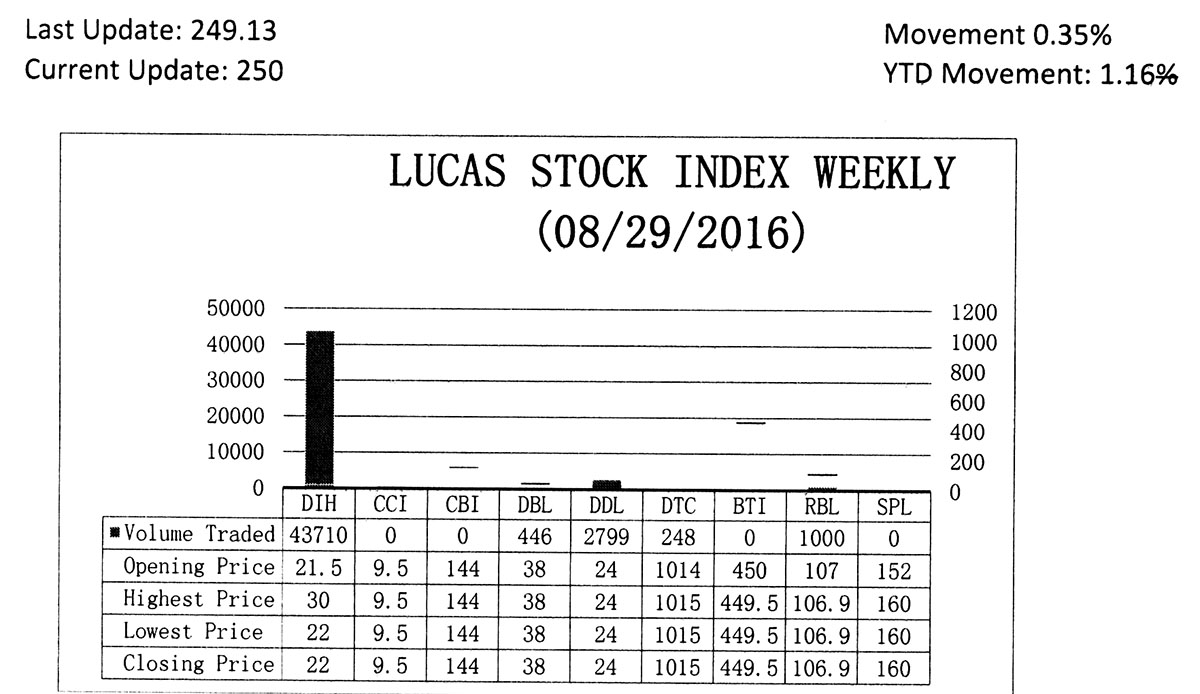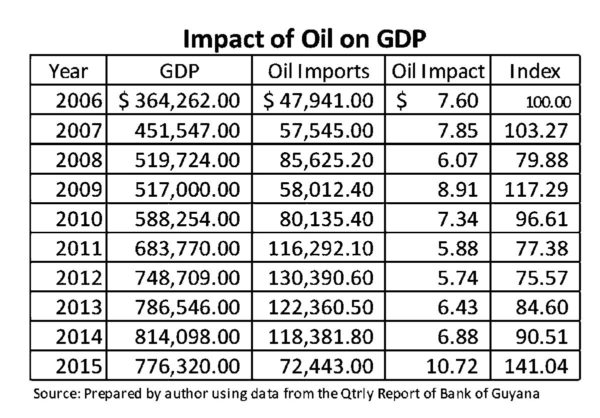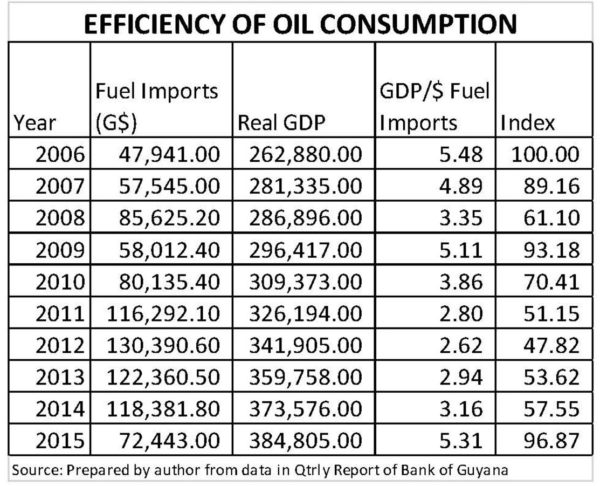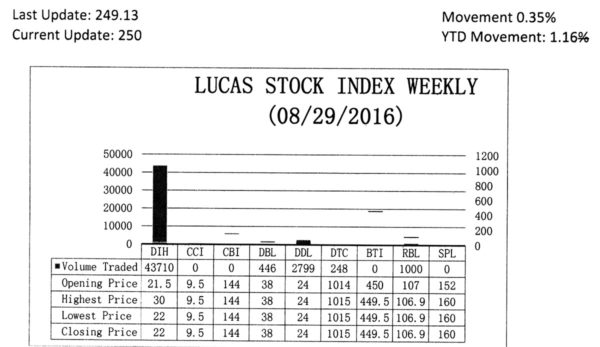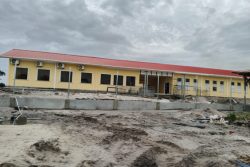The issue of sustainable development is something that Guyana will not be able to ignore going into the future. There are concerns about climate change and the impact that it could have on poverty and malnutrition simply because of what can happen to weather patterns and the adverse impact that they can have on food production and availability. Much of the consequence of climate change is linked to energy use and, if its consumption is not managed properly, efforts at controlling climate change could be a futile exercise. Oil features in all aspects of life in Guyana, including production, transportation, socialization and healthcare and from the 1970s to now Guyana was searching for a way to ease the pain from the injury imposed on its economy by the high oil prices. Guyana has considered using more alternative energy, conserving energy and is now pushing energy efficiency. This article seeks to examine the value of a focus on energy efficiency towards making economic life in Guyana much better.
Workshop
For two days in last week, participants from the public and private sectors listened to various presentations dealing with energy efficiency, one of the tools available for controlling energy consumption and dealing with global warming. They received much information about energy efficiency, the business opportunities that it has to offer and ways in which to finance initiatives towards energy efficiency. The event was sponsored by the Guyana Energy Agency (GEA) along with the Latin American Energy Organization. Quoting from documentation presented to attendees, the purpose of the workshop was to “enhance the participation of the main stakeholders of the energy sector in Guyana and discuss the proposal for [an] Institutional Framework on Energy Efficiency”. While Guyana can talk about creating an institutional framework to promote and achieve energy efficiency, it is doing so still more than 40 years after experiencing its first energy shock.
Energy efficiency
Energy efficiency is often defined as using less energy to provide the same service. There are other ways to think of energy efficiency. It is also about getting more services for the same energy input. In essence, energy efficiency is about taking something that one already has and improving it. In other words, it does not require one to reinvent the wheel. Users of energy could benefit from what already exists. Energy efficiency is one of three options available to a country to control fossil fuel consumption, the other two being energy conservation and alternative sources of energy.
The workshop referred to the main stakeholders of the energy sector. But who are the stakeholders of the energy sector in Guyana? The workshop never answered that question, but acknowledged that energy efficiency was a national issue and was important to all Guyanese. According to the National Development Strategy (NDS), 90 per cent of the utilization of the energy in Guyana was done by electricity generation, industry and mining. Electricity generation depends exclusively on petroleum. Electricity is supplied to residences, businesses and institutions such as hospitals and schools. Data on the electricity sector indicates that residential and industrial use account for 74 per cent of the electricity consumption in Guyana. Consequently, critical stakeholders in the energy sector are households and businesses. The majority of people who would have to make energy efficiency workable were not present at the meeting and therefore the burden falls on the government to advance the cause of energy efficiency and to co-opt these vital stakeholders into the national effort.
Unlike with energy conservation, pursuing energy efficiency is something that everyone can do without necessarily undermining production. It is one of the reasons why energy efficiency is a preferred course of action when it comes to managing and controlling energy consumption and continues to attract attention nationally and internationally. Energy efficiency is what the Minister of Public Infrastructure called the low-hanging fruit among the energy management policies when he gave the feature address at the opening of the workshop last Tuesday.
Unavoidable habit
For a country like Guyana, any discussion about energy is an important one. The country has suffered tremendously from its heavy dependence on fossil fuels and the absence of the financial capacity to support an unavoidable habit. According to the NDS, the principal energy sources for Guyana were petroleum, bagasse and fuelwood. At the time the observation was made, petroleum products accounted for 67 per cent of the energy produced in Guyana. Bagasse accounted for 26 percent while fuelwood accounted for seven percent of the energy produced. With petroleum accounting for two-thirds of the energy produced in Guyana, its availability and price of the product always mattered.
The question of energy has been an unsettling issue for Guyana since the early 1970s when Guyana paid US$3 for a barrel of oil and then saw prices spiral out of its reach when the Arab countries highlighted the political importance of the commodity by imposing an embargo on oil sales to punish countries that supported Israel in the war against Syria and Egypt. For both political and economic reasons, oil prices continued its ascent to higher values, pausing occasionally when supply surpassed demand to correct imbalances in the market.
It is good that the country is settling down to a policy that offers it a chance at increasing its competitive advantage. That one-third of the energy produced in Guyana came from alternative sources was good. But one must wonder how this energy configuration will play out in the future given that oil was likely to become a major part of the production structure of the country. The availability of petroleum products at perhaps lower and stable prices might act as a disincentive to the search for alternative energy sources and responsible energy behaviour.
Competitive development
But alternative energy was not the only option available to Guyana to reduce its energy consumption. When the shock came in the 1970s, the first reaction was to conserve energy. This meant buying less petroleum products in order to save critical foreign exchange that was needed to spend on critical goods that Guyana could not produce. Conserving energy by using less of it and not wasting the energy were good, but it did not make it easy for producers. Neither government enterprises nor those of the private sector could do much with conservation as a major policy. Consuming less energy without necessarily gaining more from that effort is not good enough to spur competitive development. A review of Table 1 below suggests that this might be a continuing problem in Guyana.
TABLE 1
The data in the table indicates that in 2006 Guyana was able to generate $7.60 from every dollar spent on oil imports. That figure has fluctuated over the period achieving its highest spending as a result of the use of imported fuel in 2015 and its lowest spending in 2012. However, the index enables one to see that only on three occasions Guyana was able to increase the impact of oil on its spending. That favourable outcome occurred in 2007 when spending increased 3.27 per cent, in 2009 when spending increased 17.29 per cent and last year when spending increased 41.04 per cent over 2006. Clearly, more work has to be done to determine if Guyana was using its oil imports wisely.
However, the data in Table 2 seems to confirm that Guyana might not have been consuming fuel in an efficient manner, an important factor in energy conservation and energy efficiency. The data in Table 2 refers to the amount of goods and services Guyana produced over the review period with the fuel that it imported. The closest that Guyana has come to matching its 2006 performance was last year when fuel prices and the value of fuel imports declined significantly. While the data cannot say where specifically the problem of fuel use lies, it clearly indicates that Guyana has a problem with achieving desirable levels of energy conservation and efficiency.
TABLE 2
Necessary step
Even as one speaks of energy efficiency, it is not possible to determine the desired or acceptable level of energy consumption. At what point does a government say energy consumption has reached acceptable levels. No one knows and people should not stop trying to improve the outcome from energy use. The number of households expands and with every expansion comes the possibility that energy consumption could become inefficient. The workshop therefore was a necessary step in the right direction towards greater energy efficiency. Households are significant users of energy and so are businesses. However, energy audits are needed to determine where the greatest challenges are. This course of action was emphasized at the workshop.
Rethink attitude
The workshop identified financing for energy efficiency activities also and urged financial institutions to rethink their attitude towards lending for energy efficiency projects. In this way, more households and businesses would be able to take the steps necessary to achieve energy efficiency.
LUCAS STOCK INDEX
The Lucas Stock Index (LSI) edged up 0.35 per cent during the final period of trading in August 2016. The stocks of five companies were traded with 48,203 shares changing hands. There were two Climbers and one Tumbler. The stocks of Banks DIH (DIH) rose 2.33 per cent on the sale of 43,710 shares. The stocks of Demerara Tobacco Company (DTC) rose 0.10 per cent on the sale of 248 shares while the stocks of Republic Bank Limited (RBL) fell 0.09 per cent on the sale of 1,000 shares. In the meantime, the stocks of Demerara Bank Limited (DBL) and Demerara Distillers Limited (DDL) remained unchanged on the sale of 446 and 2,799 shares respectively.
